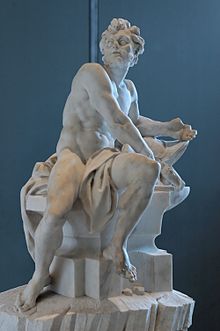Hephaestus
| Hephaestus | |
|---|---|
| God of fire, metalworking, stone masonry, forges, the art of sculpture, and blacksmiths. | |

Hephaestus at the Forge by Guillaume Coustou the Younger (Louvre)
|
|
| Abode | Mount Olympus |
| Symbol | Hammer, anvil, tongs, Volcano |
| Consort | Aphrodite, Aglaea |
| Parents | Zeus and Hera, or Hera alone |
| Siblings | Aeacus, Angelos, Aphrodite, Apollo, Ares, Artemis, Athena, Dionysus, Eileithyia, Enyo, Eris, Ersa, Hebe, Helen of Troy, Heracles, Hermes, Minos, Pandia, Persephone, Perseus, Rhadamanthus, the Graces, the Horae, the Litae, the Muses, the Moirai |
| Children | Thalia, Eucleia, Eupheme, Philophrosyne, Cabeiri and Euthenia |
| Roman equivalent | Vulcan |
Hephaestus (/hɪˈfiːstəs/, /həˈfɛstəs/ or /hᵻˈfɛstəs/; ; Ancient Greek: Ἥφαιστος Hēphaistos) is the Greek god of blacksmiths, craftsmen, artisans, sculptors, metals, metallurgy, fire and volcanoes. Hephaestus' Roman equivalent is Vulcan. In Greek mythology, Hephaestus was the son of Zeus and Hera, the king and queen of the gods. In another version, he was Hera's parthenogenous child, rejected by his mother because of his deformity and thrown off of Mount Olympus and down to earth.
...
Wikipedia
